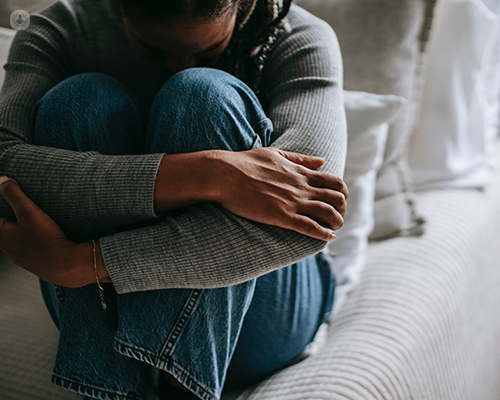What is an anxiety disorder?
Written in association with:Anxiety disorders are a group of mental health conditions that can greatly impact and disrupt daily life.
Here, renowned psychologist Dr Victor Thompson provides an expert insight into an anxiety disorder. The London-based specialist discusses symptoms, causes, treatment, and more.

What is an anxiety disorder?
An anxiety disorder occurs when a person has anxiety at a level that impacts their ability to live life freely. This can be intense anxiety or intense fear, or even worry about bad things happening.
Often, people will experience physical symptoms, too. These include:
- an increasing heart rate
- a thudding heart
- sweatiness
- feeling lightheaded
- tightness in the chest
- gastric or stomach discomfort
Sometimes, people have panic attacks (very intense and very disruptive episodes of panic) that arise within a few moments. Some of these panic attacks are predictable – such as in busy supermarkets, social situations, or with certain people, places or objects – but others just come out of the blue. Many people will avoid certain situations to try to lessen this experience of anxiety.
What can cause an anxiety disorder?
Several things can contribute to anxiety developing. These include:
- A certain temperament: We are all born with one – it is just how we are. If people are shyer growing up, this can contribute to anxiety.
- Learning to be careful: People who experience bad things growing up sometimes learn to be careful to avoid bad things from happening again.
- Believing that you are vulnerable, that you are more vulnerable than the general population, or that you are not good at handling yourself.
- Experiencing stressful or difficult life circumstances or events, either when growing up or later on, can contribute to anxiety developing.
- An overly reactive body: Some theories consider that just like how some people’s body is reactive to coffee, there are some people whose body is reactive in general. If a person who has a reactive body then thinks, “What is going on? Why am I anxious? Is there something wrong with my circumstances in life?,” this can lead to more worry and more feelings of anxiety.
How is daily life affected by an anxiety disorder?
Daily life can be greatly affected by an anxiety disorder.
Physical symptoms or sensations can be intense, and even painful, disrupting daily life. As a result, it is not uncommon for people who have anxiety to go and visit a doctor to get things checked out, thinking that perhaps they are unwell.
Mentally, people who have an anxiety disorder worry a lot. This can be worry about the physical sensations that they are experiencing, worry about things that are happening to them or to their loved ones, and even worry about events that are happening worldwide. These worries can be very disruptive, because they distract from other things that need attention or things that are more pleasant to think about.
In addition, people who have anxiety can also feel quite uneasy, be on edge, or have a sense of dread about catastrophic things happening. As a result, some people can stay away from certain situations to avoid the intense emotions and physical sensations, or to prevent bad things from happening to them or to their loved ones.
What treatment options are available? When is medication indicated?
The main treatment option that should be available for an anxiety disorder is psychological treatment – primarily, talking therapies like cognitive behavioural therapy.
The first part of this treatment involves education about anxiety, how anxiety develops, the role of adrenaline, and the body’s fight or flight response that helps to cope with dangers and real threats.
Treatment then focuses on:
- The patient’s individual experience of anxiety and how this fits with what is known about anxiety among other people.
- The role of thoughts, beliefs and expectations in the experience of anxiety.
- The triggers that can cause anxiety.
- The techniques that can calm the body and the mind.
After this, behavioural experiments are done to test out the new skills that have been acquired and practised during treatment, applying them with the intent to be free from anxiety.
When it comes to medication, this is often considered by a GP or a psychiatrist. Medication can be very helpful if anxiety is particularly intense, and it can also help patients to engage in psychological therapy or to encourage changes that are perhaps too difficult to do without medication. For many people, medication is a very good option that should be considered. However, it is not essential.
What are the main objectives of treatment?
The main objective of treatment for an anxiety disorder is to provide the relief that the patient wants; to be free of anxiety, to be able to lead a fuller life, to not have to avoid certain situations anymore, to have a sense of control, and to understand what is happening both in the body and the mind.
Can self-help or lifestyle changes help?
Self-help material can help people to become more knowledgeable about anxiety and how an anxiety disorder might affect them. The difficulty with self-help, however, is that it is challenging to know what methods particularly help. In addition, there is also the question as to whether the self-help techniques will be applied sufficiently enough to bring relief. Thus, self-help can benefit a lot, but it is not enough for some people.
Lifestyle changes can help greatly, and they should be a part of treatment. An example of this is caffeine; caffeine will stimulate the body, bringing on unpleasant symptoms for people who are sensitive to the chemical stimulant. Thus, reducing or limiting caffeine (whether it is coffee or caffeinated soft drinks) can be a good thing that should be tried at least to see its effects.
Sleep, physical exercise, a balanced diet, and spending quality time with good people also bring a lot of benefits.
Dr Victor Thompson is a highly qualified psychologist with over 20 years’ experience.
If you are suffering from anxiety or an anxiety disorder, do not hesitate to reach out to Dr Thompson via his Top Doctors profile today to receive expert advice and treatment.


